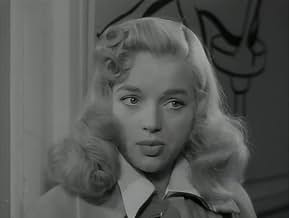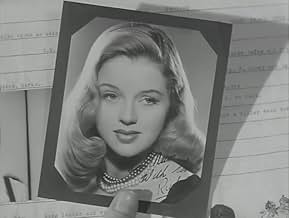J. A. Pearson's Bookshop evokes little of the warmth, cosiness or hospitality presided over by Anthony Hopkins in '84 Charing Cross Road'. Stern, pompous Raymond Huntley is frequently falsely accusing chirpy, good-natured Harry Fowler of not doing his job. It's hardly surprising that dutiful, beautiful Marguerite Chapman has no interest in joining him for an after work drink. Whilst ravishing Ruby Bruce (Diana Dors), is a largely late arrival, much to the displeasure of her colleagues. Dapper and decent George Brent ably runs the store, but with a disabled wife (Isabel Dean) to care for, he's clearly feeling the strain.
In a moment of weakness, Brent commits a minor indiscretion with Dors, for which he is profusely apologetic. The matter seems closed until the voluptuous sales girl informs love interest, Peter Reynolds, whose leering, smug, self-satisfied facial expression seems to be constantly inviting.....a deftly aimed fist, to at least temporarily wipe off that nauseating smirk! It is a measure of his despicable character, that rather than being the jealous lover, '£' signs light up in his eyes and he manipulates the naive Dors along a path of extortion and blackmail towards her boss.
A murder on the premises and the accidental, but mysterious death of his wife makes Brent the target of an intense police investigation and he receives little sympathy or support from the humorless Huntley. In what begins to play out like Phase two of 'The Phantom Lady', it's left to the doting and devoted Chapman to clear Brent's name, even at the risk of endangering her own life.
In an era of movie making when justice had to be seen to be done, it's unsurprising that 'The Last Page' concludes with a long sentence. The film is hardly overflowing with novel ideas, but there is sufficient action between the covers to maintain interest.

































